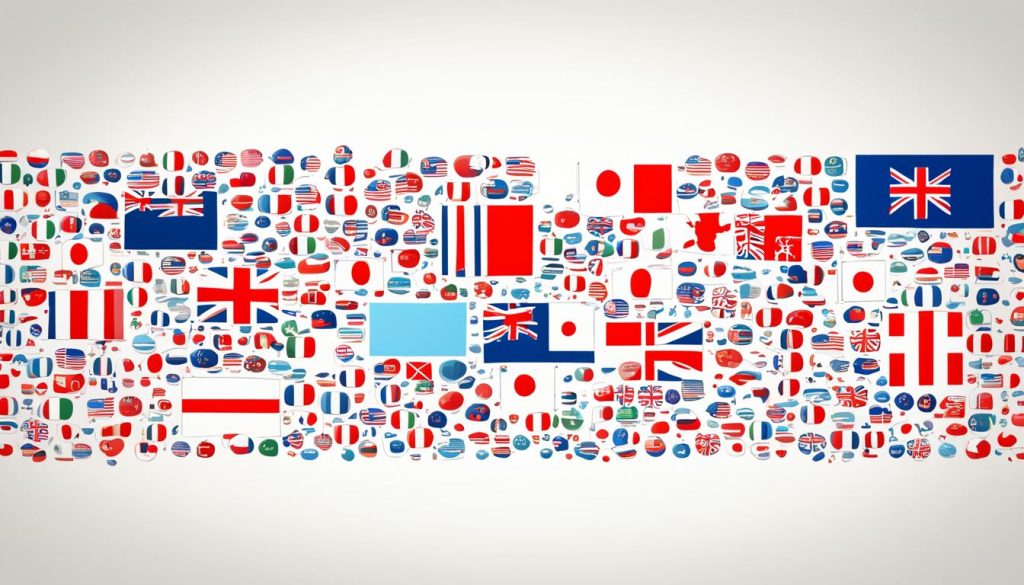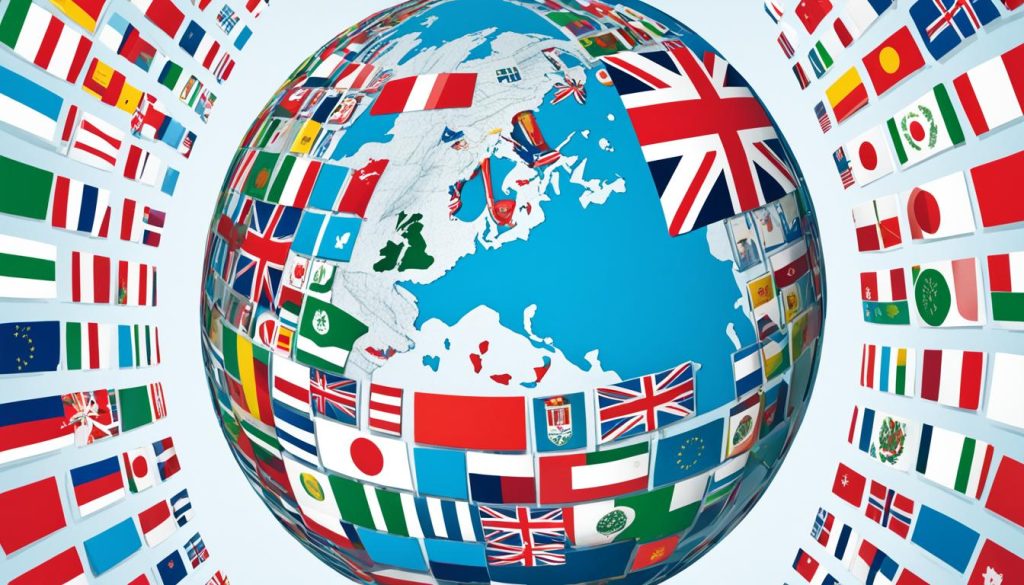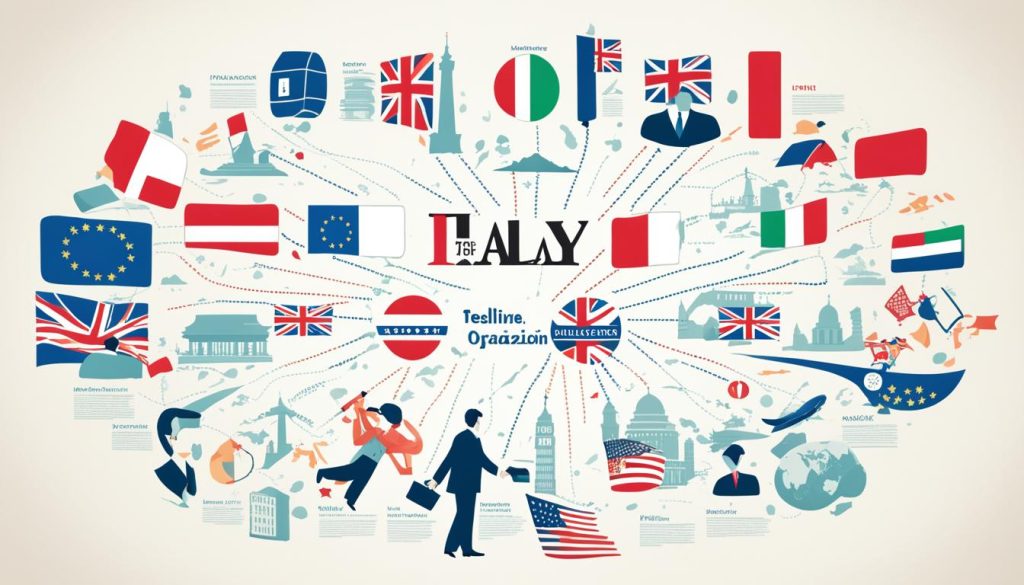Understanding business manners and cultures is key in global dealings. We delve into Italy, Japan, and the UK’s business worlds. Each country shows how tradition and international trade mix together. These differences help us in building strong international ties and success in business.
Introduction to Business Etiquette Across Cultures
Learning about international business etiquette is crucial for professionals in global trade. Cultural differences affect corporate relations, making even simple exchanges complex. It’s essential to respect these cultural differences for success in global business conduct.
To build strong international ties, it’s important to understand global business manners. This involves knowing how to act, what to wear, and when to meet. These skills are vital for entrepreneurs and business leaders today.
-
Punctuality is expected in the UK. In Italy, people may take a more casual view on time.
-
Dress Codes differ worldwide. Italy enjoys flair while Japan prefers conservative dress. It’s good to research and dress appropriately.
-
Gift-Giving in Japan shows care in business, important for expressing goodwill. It requires understanding cultural traditions and symbols.
-
Meeting Protocols in the UK are formal, with set agendas. Other cultures value personal connections before business talks.
Success in global business requires respecting cultural values. Going beyond language to grasp cultural subtleties is key in international settings.
The effort to learn about international etiquette can give you an advantage. It makes global business smoother and more successful.
The essence of international business etiquette is about respect. It shows you value the customs of your international allies. This awareness is central to success in global business conduct.
The Historical Evolution of Business in Italy, Japan, and the UK
Global commerce is a complex web spun from history. It’s woven with economic shifts in key nations. Italy, Japan, and the UK show us how countries evolve economically. Their paths shape modern business worlds.
The Industry Renaissance in Italy and Its Modern Business Landscape
Italy experienced a rebirth in its industries. It became a leader in fashion and design. This era marked the start of a new business culture. It values beauty and new ideas. This change celebrates ‘Made in Italy’.
Japan’s Economic Miracle Post-WWII and Current Corporate Philosophy
Japan made a remarkable recovery after the war. Technological progress and a strong work ethic fueled it. This led to a special way of running companies. It mixes tradition with new ideas. Japan remains a world leader.
From the Industrial Revolution to Financial Services in the United Kingdom
The UK’s industrial age is over. It’s now a leader in financial services. These services are crucial to the economy. They impact global markets and business plans.
Cultural Dimensions and Business Conduct in Italy
Exploring Italian business culture reveals a mix of tradition and modernity. It’s built on a fine balance between established hierarchies and the importance of social bonds. This creates a distinctive setting where business happens through official routes and personal networks.
Italian firms excel in navigating this complex environment. They show great respect for authority while valuing personal relationships and trust. This approach is central to the Italian way of doing business.
Understanding Italian Hierarchical Structures in Business
Italian companies seem to have a strict hierarchy at first look. However, diving deeper, one notes a blend of authority and a caring attitude from leaders towards their teams. These features distinguish Italian business structures.
Role of Relationships and Trust in Italian Commerce
Strong relationships and trust are the bedrock of Italian business. Here, trust is as key as money, leading to lasting partnerships. A simple handshake or a coffee shared can mean as much as a written contract, highlighting the value of personal connections in business.
Japan: A Blend of Tradition and Innovation in Business
Japanese business customs combine respect for tradition with modern innovation. Understanding this cultural mix is key to success in Japan. The practice of exchanging business cards, ‘meishi koukan’, shows deep respect for hierarchy. It highlights the importance of age-old customs alongside modern business methods.
The ‘nemawashi’ practice is central to Japan’s corporate world. It involves building consensus and is crucial for decision-making. It shows respect for seniority and promotes inclusive and thorough corporate actions. This approach blends tradition with efficiency, leading to innovation. Meetings show a high respect for order and hierarchy. This is evident in seating arrangements and speaking turns, reflecting an individual’s role and age.
- Business Card Exchange: A key ritual, highlighting precision and respect in Japanese business interactions.
- Hierarchical Seating: Meeting seating is arranged by company hierarchy, showing respect for roles.
- Sophisticated Technology: Japanese companies lead with high-tech solutions, showcasing their innovation commitment.
- Seniority in Communication: Age and experience guide conversations, valuing tradition and respect.
These practices highlight Japan’s emphasis on respecting heritage while seeking success. Engaging in the Japanese market means embracing a blend of tradition and innovation. This environment demands cultural sensitivity and a progressive mindset.
Business Culture in the United Kingdom: A Global Outlook
The UK’s corporate scene is known for being formal and professional. It shows a global business mindset that values promptness, detailed prep, and constant politeness. These UK business rules help form lasting relationships and succeed in the global market.
Meeting and Greeting: Forming the First Impression
First meetings are crucial in the UK. The norm is to shake hands firmly, greet politely, and arrive on time. This balance of friendliness and formality sets the stage for future business dealings. Using titles before being invited to do otherwise reflects respect and proper manners in business.
Business Meeting Etiquette in the UK Context
Meetings in the UK are well-planned and goal-oriented. Clear communication is key, focusing on expressing ideas well and listening to others. Meetings aim to be collaborative but decisive to foster good discussions and choices. Taking notes is seen as professional and shows you’re paying attention, highlighting the careful approach of UK business culture.
Company Organisation and Management Styles
In the business world, how a company is organised and managed is crucial. These aspects are influenced by culture in different countries. They affect decision-making, leadership, and strategy execution. This exploration looks into Italy, Japan, and the United Kingdom. It shows how each country’s culture affects their corporate management.
Comparing the Italian Approach to Corporate Hierarchies
In Italy, companies often run like families, with a personal touch in management. Building relationships is important here. Leaders blend authority with care, creating a respectful and loyal workplace. This environment values strong personal connections.
Consensus and Respect for Seniority in Japanese Firms
Japanese companies are very different, valuing hierarchy and consensus. They deeply respect seniority. This shapes their entire corporate organisation. Their approach avoids conflict, seeking harmony instead. It leads to teamwork, but always respects the elders’ wisdom.
Adopting the British Fair-Play in Management Practices
The UK values fair-play and meritocracy in management. Their corporate organisation promotes transparency. This ensures everyone has a fair chance to succeed based on their achievements. British management balances personal success with the company’s goals.
Different management and organisation approaches help companies succeed worldwide. Italian firms value tight-knit family-like hierarchies. Japanese companies prefer consensus and respecting elders. The British go for fair-play and merit. Adapting to these styles is key for global success.
Communication Nuances in International Business
At the core of international business, we find different communication styles. These play a crucial role in business negotiations. Knowing about cultural differences is essential for strong international ties.
Communication is not just about words. It involves gestures, context, and meanings unique to each culture. We explore the subtle differences in global business communication here.
- Non-Verbal Communication: It’s vital to understand silent cues in places where direct talk is rare.
- High-Context vs Low-Context: Some cultures favour hidden messages over clear words.
- Politeness and Forms of Address: Knowing how to correctly address someone shows respect.
In Italy, people prefer hints to saying ‘no’ directly. This shows a preference for gentle communication. The real meaning is often between the lines.
In Japan, respect and maintaining peace are crucial. The way people talk and act reflects their respect for hierarchy. Tradition and respect blend in business manners.
In the United Kingdom, being polite and modest is key, even when it might not seem necessary. This approach leads to business deals done with courtesy.
- Cultural Sensitivity: Remember to respect cultural norms and traditions during conversations.
- Effective Listening: Paying close attention to others’ points of view is important.
- Clarity and Consistency: Make sure your points are easy to understand across cultures.
Today, winning in global business is not just about strategy or finances. It’s about skillfully handling the complex world of international communication. This ensures clear and respectful idea sharing.
Navigating Negotiations and Decision-Making
The world of international trade depends much on how well negotiations and decisions are made. Getting to know business persuasion in different cultures helps a lot. Looking at Italy, Japan, and the United Kingdom, we see unique ways of handling business based on their cultures.
Italian Negotiation Tactics and the Art of Persuasion
In Italy, doing business is like crafting a masterpiece. It’s all about conversations that are open but clever. For Italians, it’s important to build relationships and trust first. Often, this happens over long meals before talking serious business.
Japan: Where Harmony Balances Assertiveness in Negotiations
In Japan, keeping harmony and thinking as a group matter a lot in negotiations. Being too forward is avoided to keep everyone together and respect the chain of command. Their way of doing business respects everyone involved, aiming for agreements that avoid conflict and build lasting partnerships.
Pragmatism in British Negotiation and Decision Making
Negotiations in the UK are grounded in realism. They prefer to be clear and to the point, making decisions based on hard facts. This no-nonsense style is balanced with a touch of British politeness, seeking deals that work well for everyone while keeping things professional.
Attire and Physical Presentation in Business Settings
Unlocking success in international business requires more than just knowing the numbers. It’s important to understand the dress code and professional attire. These should match the culture you’re working in. How you dress is a powerful way to show respect and understand local traditions.
- In Italy, fashion meets business. There, executives wear professional attire that shows Italy’s role as a top fashion leader.
- Japanese business attire is all about precision and looking modest. This reflects their deep respect for tradition and attention to detail.
- In the UK, business folks stick to a traditional and very formal style. Their dress code is about keeping things classy and understated.
Your choice in clothes and how you present yourself at work matters a lot. It shows your wisdom and respect for the culture. This can be the key to successful business deals.
Work-Life Balance and Employee Wellbeing
Understanding work-life balance sheds light on how cultures view employee wellbeing. Around the world, in places like Italy, Japan, and the UK, people see work and life differently. These countries show us how work and personal life can balance.
Italy’s Dolce Vita: Finding Harmony in and out of the Workplace
In Italy, balancing work and life is key, inspired by ‘la dolce vita’. This means enjoying life fully with leisure, family, and fun. Work practices there support a laid-back lifestyle, long holidays, and low stress. For Italians, work is part of a bigger picture where employee wellbeing matters.
Japanese Work Ethic: The Pursuit of Excellence and Efficiency
Japan takes a different path, valuing hard work and discipline highly. Here, the commitment to work often comes before personal time. This makes balancing work and life tough. But Japan is starting to adapt. With ideas like ‘Premium Fridays’, they’re finding ways to keep their strong work culture while adding some balance.
Changing Attitudes Towards Work-Life Balance in the UK
The UK’s view on work-life balance is changing. It used to focus on hard work and business. Now, the UK values personal time more, with flexible jobs and remote work. It shows a shift towards a life that values personal and work achievements equally.
The mix of work and personal life is blending more each day. Companies should embrace this change. By doing so, they’ll improve employee wellbeing and build a strong, happy workforce. This leads to a better work environment for everyone.
Leveraging Local PEO Services for International Expansion
Businesses wanting to grow globally will find PEO services very helpful. Local expertise provided by these services is vital. It helps with understanding the different business rules and employment laws in new countries.
PEO services help firms enter global markets smoothly while following local laws. They let companies focus on growing their operations. This way, businesses can enter new markets without breaking any laws or facing common problems.
- Compliance assurance with local employment laws, reducing legal risks.
- Payroll management, allowing for cost-effective allocation of resources.
- Strategic adaptation of business models to align with local market conditions.
Working with a good PEO gives businesses key insights into the target market. A local PEO understands the culture, economy, and hiring scene, which is key to succeeding abroad.
PEO services are crucial for businesses going global. They ensure that a company’s operations abroad are solid. Using PEO services wisely can greatly help a company compete internationally.
International Digital Marketing Strategies
In the fast-paced world of global trade, digital marketing plays a vital part. It helps brands reach and stay relevant worldwide. By understanding cultural preferences, marketers can tackle the unique challenges of different markets. This helps build deeper connections and trust with varied consumer groups.
Understanding Cultural Preferences for Effective Marketing
To truly connect, digital marketing must respect cultural influences on shopper behavior. Brands need to explore and consider the local tastes and habits. This approach should influence both the creative and strategic aspects of their campaigns.
Adapting Digital Content to Localise Brand Messaging
Effective localisation rests on content adaptation. Tailoring content well can break down language barriers, reflect local customs, and match the values and expectations of the audience. This careful adjustment boosts the relevance of marketing efforts and the chances of a brand’s success overseas.
- Transcreation of marketing materials to resonate with cultural values
- Customisation of digital experiences to local buying habits and preferences
- Strategic employment of local insights for more impactful marketing narratives
Legal Systems, Regulations, and Business Compliance
Understanding different legal systems is vital for businesses going global. The challenge of sticking to local regulations is critical for success abroad. It turns international compliance into a key part of a global business plan.
Countries have their own legal rules that affect businesses. These laws cover how a business is set up, tax, and workers’ rights. Knowing these laws is a big plus for any company worldwide.
Being able to adapt and plan ahead matters a lot in business rules. Rules on international trade, environmental care, and keeping data safe vary a lot. Handling these well means avoiding big legal problems and showing you’re a responsible business.
- Learning the legal rules of the countries you work in.
- Following local tax laws and international tax agreements.
- Respecting workers’ rights to make a good workplace everywhere.
- Keeping up with law changes in the fast-moving global scene.
Staying on top of compliance opens doors in the world market. Being committed to following the rules builds trust and boosts your business reputation. This leads to better market position and stronger business health.
Making sure a company’s rules match up with laws is key. This needs experts who can turn complex laws into clear business actions. Success in global trade is built on understanding and following these laws closely.
Impact of Globalisation on Domestic Business Practices
World economies are becoming more connected. This forces domestic businesses to find new ways to compete. They are mixing adaptation with keeping their cultural identity. This text explores how Italy, Japan, and the UK are dealing with global challenges. They keep their unique business practices alive.
Italy and the Global Market: Adapting to Change While Maintaining Identity
Italy is known for its top-quality and creative products. It has responded to globalisation by mixing its cultural heritage with its business strategies. Italian brands are still seen as unique and high-quality. They do this while adapting to global markets. They keep “Made in Italy” as a mark of excellence, balancing international demands with local traditions.
Japan’s International Business Strategy: Adapting to a Globalised Economy
Japan shows how to blend traditional ethics with new technology in business. Despite keeping its classic business culture, Japanese companies are innovating. They compete globally without losing their identity. This has kept Japan strong in the world business arena.
How the UK Maintains Its Competitive Edge in a Globalised Market
The UK has always supported free trade and globalisation. It stays competitive by welcoming cultural diversity into its businesses. The UK has a strong focus on service industries. This includes financial services and technology. This approach helps the UK thrive in a global market.
Conclusion
Looking at business and culture in Italy, Japan, and the UK shows how key cultural intelligence is globally. It’s crucial, not just helpful, for businesses wanting success worldwide. Understanding different business manners fully is essential.
When companies grasp each country’s business ways, they adapt better. They use smart ways to talk and deal with others. Avoiding cultural mistakes, they build strong global ties. This skill helps them blend into new markets smoothly.
A company’s growth in global business relies on learning from diverse cultures. Working across cultures is how to win on the international scene. Italy, Japan, and the UK offer unique insights. Using these insights well leads to broad and victorious international projects.
FAQ
Q: What are the key differences in business etiquette between Italy, Japan, and the United Kingdom?
Q: How has history shaped the modern business landscapes of Italy, Japan, and the UK?
Q: What role do relationships play in Italian business culture?
Q: How do Japanese businesses incorporate their traditional values into their corporate practices?
Q: What constitutes a positive first impression in UK business culture?
Q: How do company organisation and management styles differ across Italy, Japan, and the UK?
Q: What are the key factors to consider when communicating with international business partners?
Q: Can you describe the negotiation and decision-making styles in Italy, Japan, and the UK?
Q: How does business attire vary between Italy, Japan, and the UK?
Q: How do Italy, Japan, and the UK differ in their approach to work-life balance?
Q: Why is utilising local PEO services beneficial for firms expanding internationally?
Q: What should be considered when creating international digital marketing strategies?
Q: How does the legal framework in a country affect international business operations?
Q: How is globalisation affecting domestic business practices in Italy, Japan, and the UK?
Source Links
- https://www.abebooks.co.uk/9788847025677/Italy-Japan-Similar-Comparative-Analysis-8847025672/plp
- https://www.business.com/articles/so-international-business-etiquette-from-around-the-world/
- https://www.ons.gov.uk/economy/economicoutputandproductivity/productivitymeasures/bulletins/internationalcomparisonsofproductivityfinalestimates/2020
















